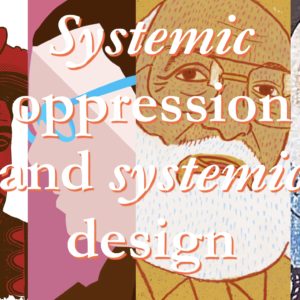
This talk was submitted to Interaction21 and was not accepted by the selection committee. UPDATE 1: I am trying again to Interaction22. If you would like to back me up, please nominate me. UPDATE 2: It did not go through, so I gave up.
Background: Designers like to picture themselves as heroes who can save users from bad design. Even if they can do that, they cannot save people from a deeper problem: the condition of being a user. Women, Black, Indigenous, immigrants, and other historically oppressed groups have to stay within the bounds of what a user is supposed to do, otherwise “they might break something”. While designing “idiot-proof” technology, designers are denying the oppressed to fully develop as technology producers. Due to this denial, the so-called users easily fall prey to data exploitation, surveillance, and invisible work. Similarly to how consumerism made the oppressed feel they could overcome oppression by rejoicing in conspicuous consumption, userism makes these same people feel they are “empowered” by a technology they do not own or understand.
Summary: Against Userism is a call to action for designers to share their privileges in technology development through intersectional feminism, participatory design, designing liberating technologies, joining critical education programs, and fighting prejudice in the technical milieu.
Major takeaways:
- Oppressed people have to face another layer of oppression in technology relations: userism.
- Userism is the historical and structural reduction of the oppressed to the condition of being a user (and not a producer) of technology.
- Calling them “people” or “humans” instead of “users” is not enough to overcome userism.
- The oppressed need to develop their own technology to liberate from oppression. Designers can help with that, but must avoid patronizing liberation.
Motivation: I teach interaction design in Brazil for now 10 years. My students sometimes ask for my help in designing projects against a certain kind of oppression. As expected from a colonized territory, they usually come to me with the expectation of applying a design toolkit imported from an international metropolis. Instead of helping to understand the historical condition of oppression, these toolkits help to transform the oppressed into the new (dependent) users of a metropolitan technology or service. I explain the problems with user-centered and human-centered design, but not all of them agree with the decolonial argument. After fighting colonization in my territory, I decided to offer this talk to see if there are more people in other territories facing a similar situation so that we could join forces.
Relevance: Social movements have recently put on the designers’s table the issue of structural racism, colonization, sexism, homophobia, xenophobia, and other kinds of oppression. Digital technology is no longer considered neutral in these struggles, and critical voices point at their role in hiding and amplifying oppression. This talk points to some of the things that can be done to fight oppression from the privileged position of a designer. Moving beyond the discussion of diversity in user recruiting and in the technology workforce, this talk addresses a specific form of oppression in which technology plays a major role.
My experience on the topic: As a hetero cis man, I did not grow in a historically oppressed social group (except for being considered Latino abroad), however, after getting to know intersectional feminism, critical pedagogy, and theater of the oppressed, I begin to play the role of an ally to all oppressed groups. Besides promoting my students, I have published some academic papers on the need for a critical design pedagogy that deal with technology-mediated oppression. Together with peers from a handful of Brazilian universities, I founded the Design & Oppression network, which offers an international Designs of the Oppressed course. After long debating on how to position design within oppression struggles, we came to the conclusion that including the oppressed as users (and only as users) is a trap that reinforces oppression.
References
Gonzatto, R.F. and Van Amstel, F.M.C. (2022), “User oppression in human-computer interaction: a dialectical-existential perspective”, Aslib Journal of Information Management, Vol. 74 No. 5, pp. 758-781. https://doi.org/10.1108/AJIM-08-2021-0233

